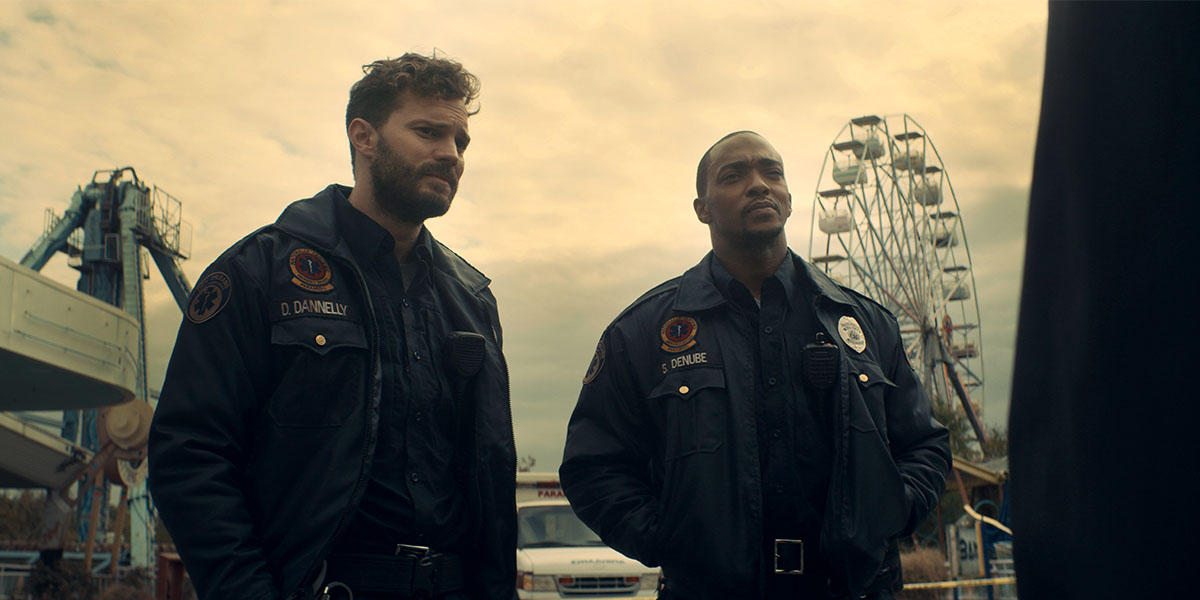Sometimes patterns reveal themselves at film festivals, wherein multiple movies work in a similar way that makes them ideal candidates to write about in the same piece—such as in the true stories of my second day at the fest. Sometimes they don’t and you see three films in a row that have essentially nothing in common. That’s the case here, and if seeing this trio consecutively reveals anything about TIFF it’s the remarkable range of entertainment available at a festival like this one.
The first film I put on my schedule when TIFF announced dates and times was the 3pm world premiere of Justin Benson and Aaron Moorhead’s “Synchronic.” There was no way I was missing the latest from the directors of the excellent “Spring” and the even-better “The Endless.” These guys are doing something daring and new with genre, making low-budget films that could technically be called sci-fi but are deeply philosophical regarding what it means to be human. They focus on issues like grief and addiction more than mere genre conventions. In their latest, they tackle nothing less than the impermanence of human existence. We only have today. The past is something in which we can literally get lost in this film and the future isn’t guaranteed for its protagonist. It’s a fascinating blend of “Bringing Out the Dead” and “Inception,” and it’s the kind of ambitious filmmaking I want more of from my genre directors. These guys are for real.
Steve (Anthony Mackie) and Dennis (Jamie Dornan) are New Orleans paramedics who don’t get enough sleep or therapy to deal with their difficult profession. Dennis has a wife (Katie Aselton) and teen daughter named Briana (Ally Ioannides) to help, but Steve is on his own, comforted only by one-night stands, functioning alcoholism, and his beautiful dog. And then Steve gets horrible news—he’s got a brain tumor and he may only have a few weeks left—just as the pair stumble upon a bizarre series of deaths related to a designer drug called Synchronic. It turns out the drug has the ability to alter time in very dangerous ways, and Steve jumps into experimenting with it after Briana goes missing. Can he reunite his best friend with his daughter before the brain tumor kills him and can he navigate what Synchronic does in a way that doesn’t take him out first?
Using New Orleans wonderfully, “Synchronic” has a dark, noir-esque look that amplifies its tension. New Orleans has often felt like a place where the impossible might be slightly possible, and it’s also loaded with history, an important aspect of Benson and Moorhead’s film. In their vision, the past is deadly and dangerous, which both creates action tension and serves to comment on not just Steve’s emotional state but the dark background of this country. When we face things like cancer diagnoses, we often regret what we didn’t do, living in our own pasts instead of in the moment. We get stuck there. As in their other movies, Moorhead and Benson allow the viewer to do most of this symbolic unpacking, resulting in a film that resonates on a deeper level than most disposable science fiction. There are some scenes that didn’t completely work for me, but I didn’t care overall because of the ambition and compassion in every aspect of the movie. Next time these guys have a movie at a fest, it will probably be the first on my schedule again.

Conversely, I wasn’t really looking forward to Fernando Meirelles’ “The Two Popes” until the Telluride response was so positive, and it fit nicely into my Saturday morning schedule. I’m very happy it did. This is a smart, empathetic film about the need for both resilience and uncertainty in a faithful heart. And it’s a funny character piece for a pair of living legends, who just happen to play popes.
After a lavish introduction that reveals some of the controversy around the election of Pope Benedict (Anthony Hopkins) to the papacy in 2005, “The Two Popes” essentially becomes a two-hander between Benedict and Jorge Bergoglio (Jonathan Pryce), who we all know will become Pope Francis. Benedict calls the Archbishop of Buenos Aires to meet with him after Bergoglio reveals that he wants to retire. With rising controversy about the church and its handling of recently revealed scandals, Benedict argues that Bergoglio’s retirement would be seen as an indictment from the progressive religious leader. And, after all, Benedict is considering doing something unheard of—retiring.
Anthony McCarten’s script (“Darkest Hour,” “The Theory of Everything“) is his best to date, giving Pryce and Hopkins razor sharp dialogue that both humanizes them and allows for deep, philosophical examination of faith. These are two very different men—a conservative German who argues that any sort of change is against the church and a progressive leader who worked with the poor and knows that the public perception of his church is fading – but McCarten allows both worldviews to resonate. He arguably humanizes Benedict a bit too much given what we know about how he handled child abuse in the church, but his purpose is to illuminate how much the Pope and the religion he represents needs to be both committed to its long history and willing to look forward to the future.
Both men are great, but it’s possible that Pryce has never been better. He is charming, smart, and engaging, capturing the man instead of the saint—McCarten is clever to open the film with Bergoglio trying to order a plane ticket on the phone and being hung up on when the representative on the other end thinks it’s a prank call. Pryce finds the deeply empathetic register in Bergoglio’s character. While this is a film of incredible dialogue, Pryce also finds a way to portray Bergoglio as a listener, someone who has seen and heard so much of the human condition, but know there’s always more work to be done.

Finally, there’s the disappointing “How to Build a Girl,” a movie that captures the inconsistent, emotional days in which young people shape their personality but does so in such an episodic and ultimately manipulative way that it left a bad taste in my mouth. Coky Giedroyc directs a script co-written by Caitlin Moran, based on her memoir, and the great Beanie Feldstein dives into the part but she’s let down by a film that doesn’t know what it wants to do or say. Kind of like a teenager.
Feldstein plays Johanna Morrigan, a British girl—yes, Feldstein does the accent, which may be technically fine but which you can see her doing every time she talks—who is waiting for that big moment that changes her life. She literally talks to the photos of literary and historical heroes on her wall and longs for a Mr. Darcy to whisk her away from her council estate misery. Believe it or not, she ends up becoming a music critic, first lavishing praise over her celebrity crush Jack Kite (played by a charismatic Alfie Allen) and then reshaping her writer persona of Dolly Wilde into a troublemaker. She drinks a lot, makes fun of musicians, crosses every possible line in terms of journalistic ethics, and has a lot of sex. And then, of course, she learns a lesson or two.
Cramming the entire coming-of-age of a girl into a film like this is a challenge in terms of believable character arc. We have to buy not just the various iterations of Johanna as she becomes something of a superstar and then finds herself again, but we have to believe the transitions, and they’re just not smooth here at all. Johanna may be based on a real person, but that doesn’t automatically mean she feels real in the movie. The dialogue, the drastic tone changes, the awful final act that turns a cynical film into a sentimental one—all of these add up to a movie that just never clicks. It doesn’t build so much as tear apart with no idea how to put back together again.












